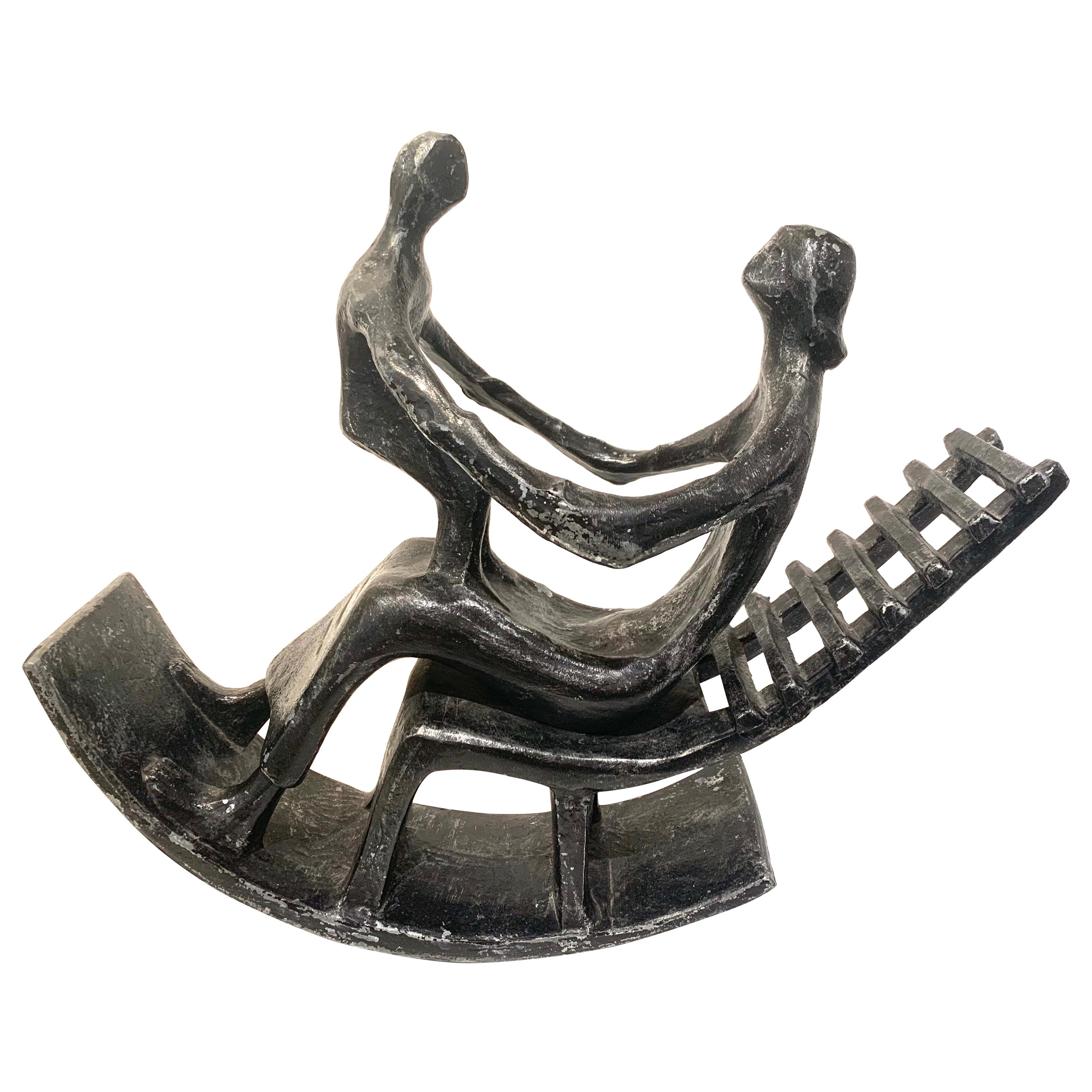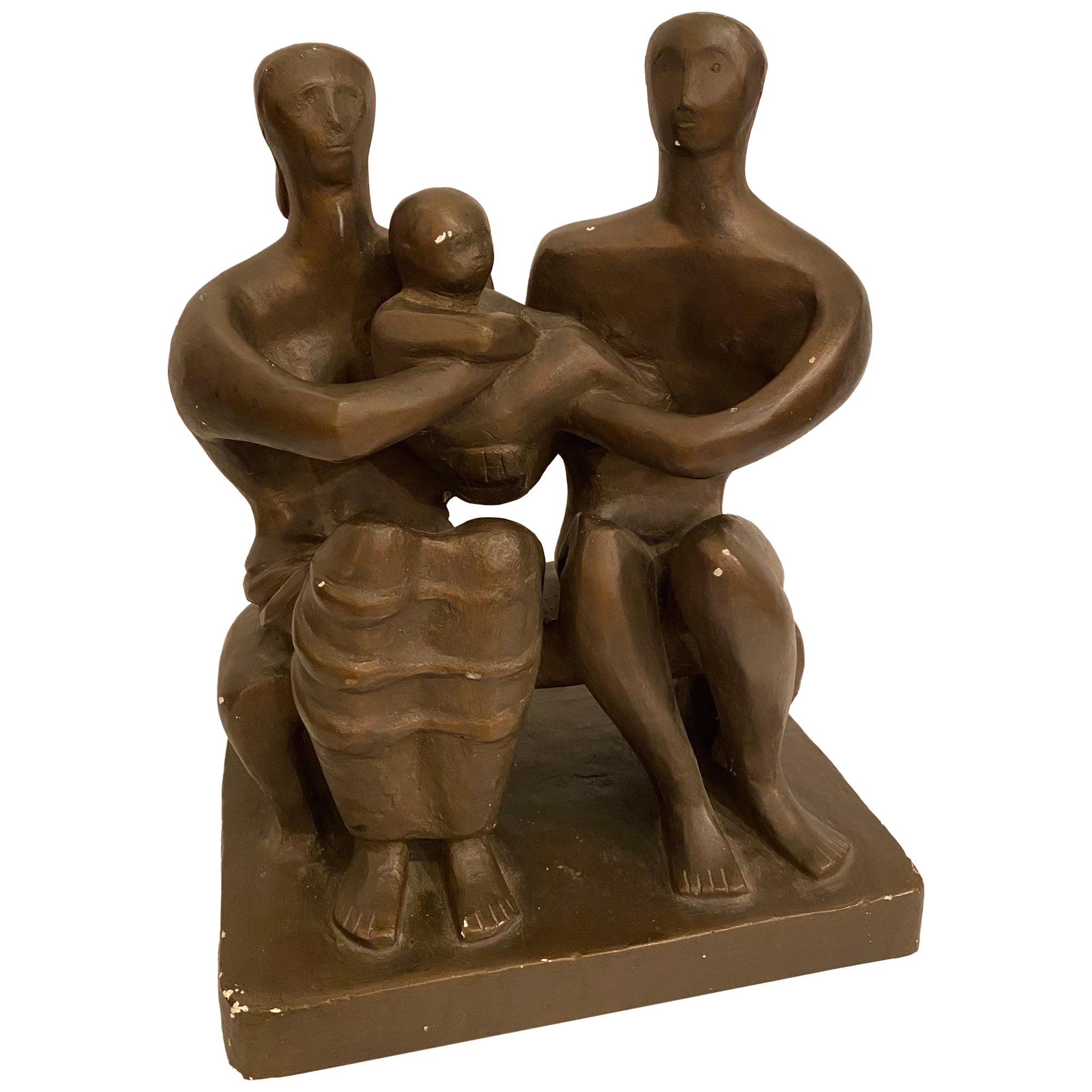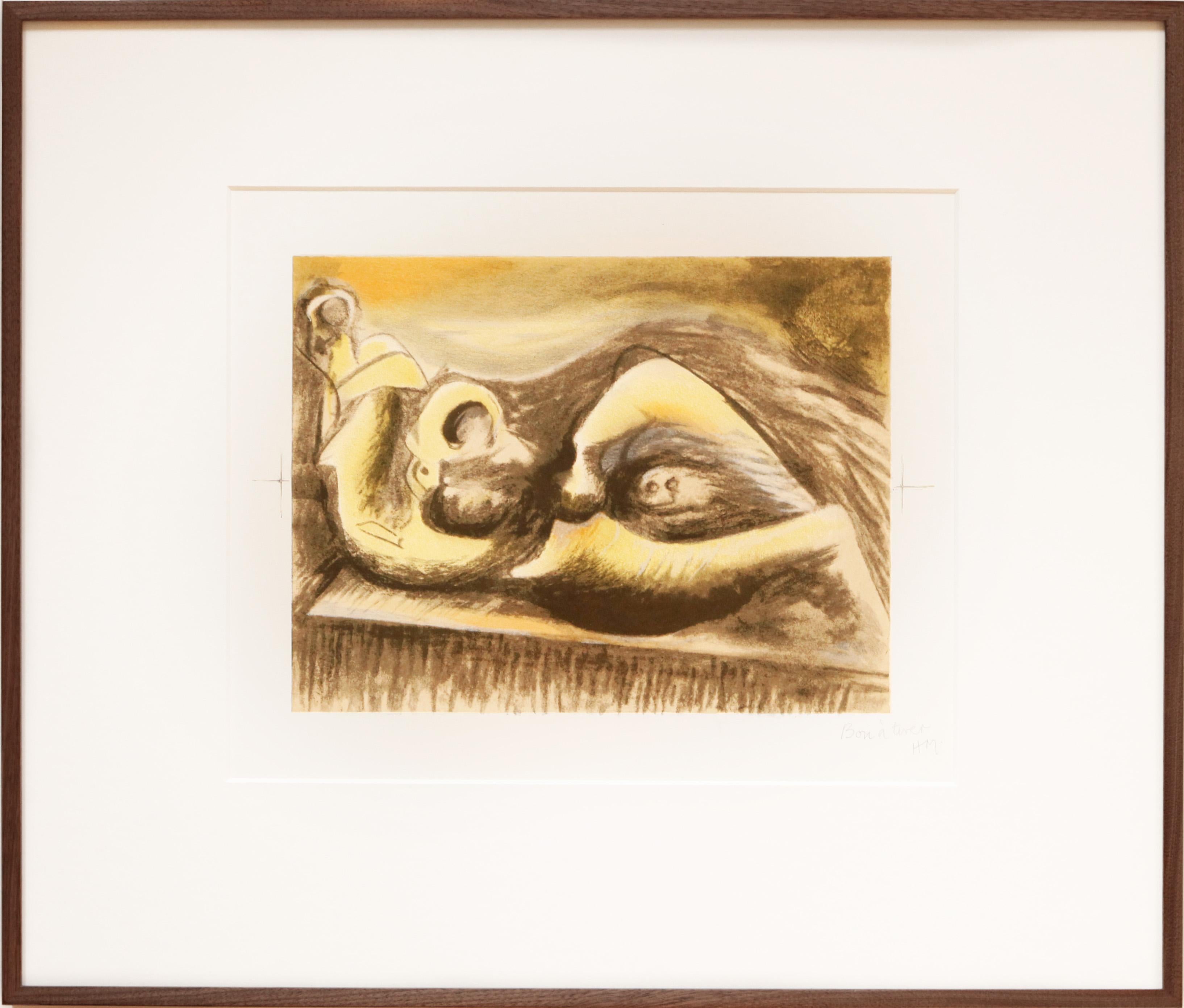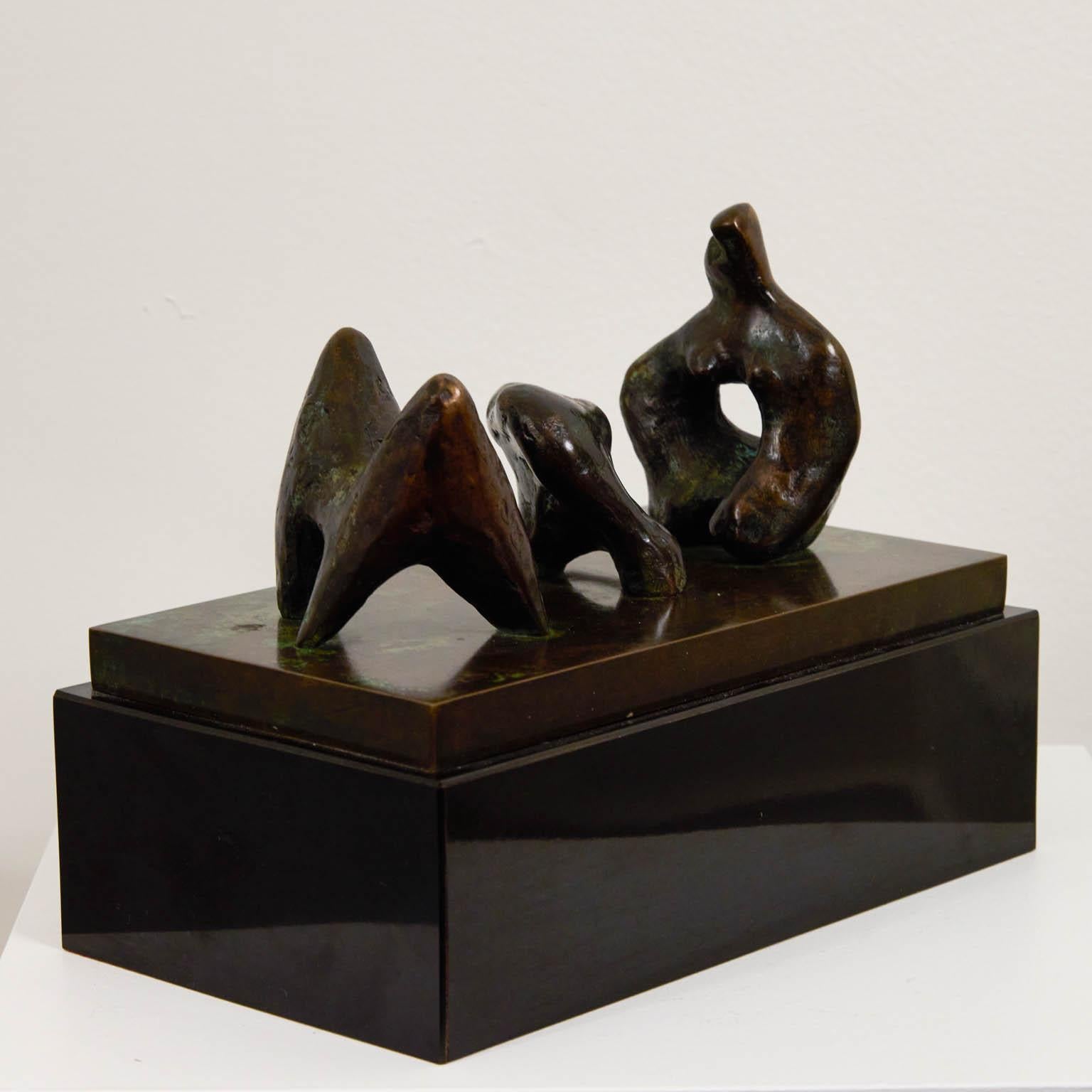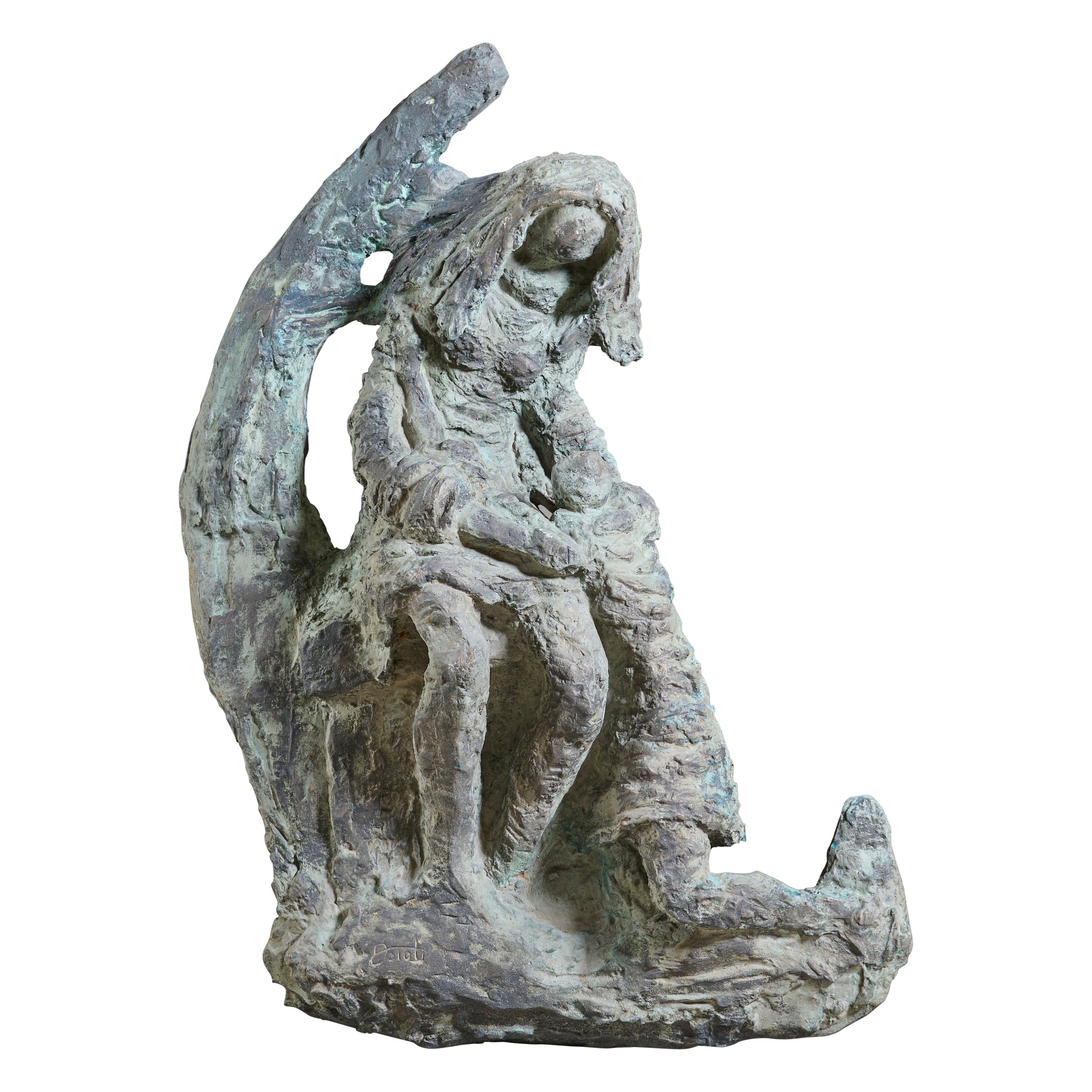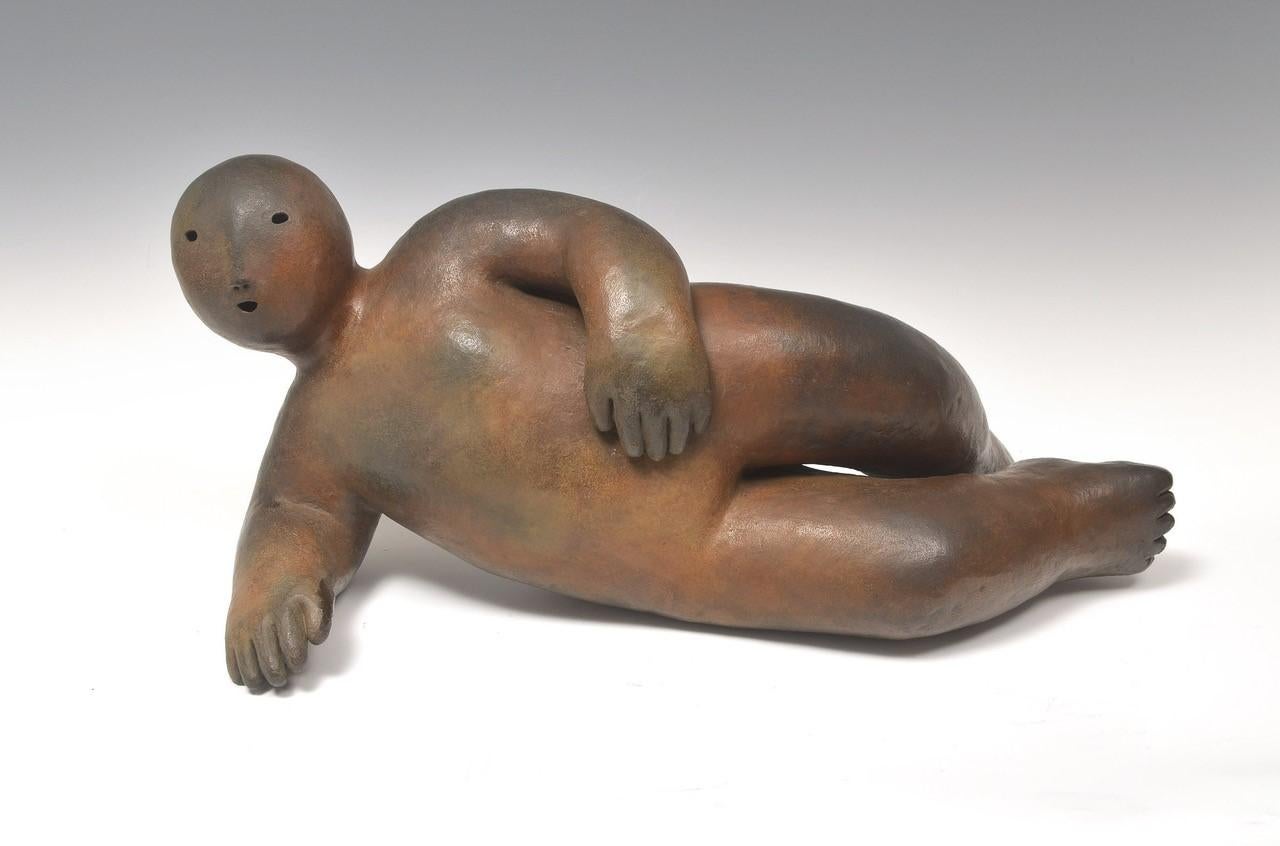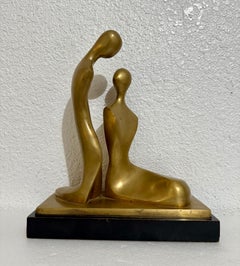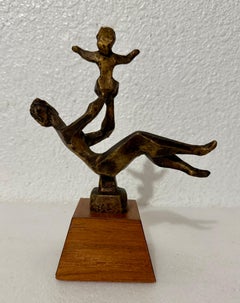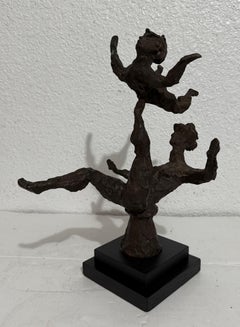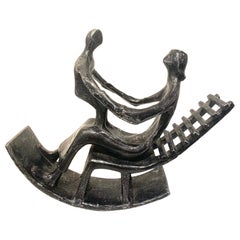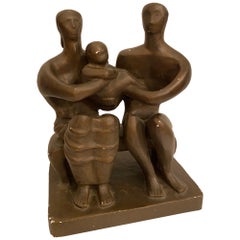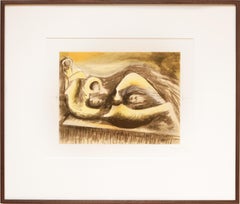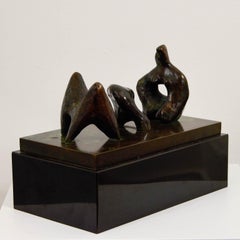Items Similar to In the style of Henry Moore, Mother and Child in Rocking Chair
Want more images or videos?
Request additional images or videos from the seller
1 of 16
UnknownIn the style of Henry Moore, Mother and Child in Rocking Chairc.1950s
c.1950s
$2,200
£1,712.80
€1,947.74
CA$3,162.97
A$3,473.56
CHF 1,813.96
MX$41,458.37
NOK 22,981.11
SEK 21,419.30
DKK 14,547.07
About the Item
This is a cast metal sculpture of a woman and child, mother and baby in a rocking chair. It has a patina on a white metal. Not sure if it is steel or aluminum. It is and older vintage piece and has wear to patina where it sits and rocks on table. It is not signed or numbered and there is no foundry mark. Hence it is being sold as being after or in the manner of Henry Moore.
Henry Spencer Moore (1898 – 1986)
Moore was born in Castleford, the son of a coal miner. He became well-known through his carved marble and larger-scale abstract cast bronze sculptures, and was instrumental in introducing a particular form of modernism to the United Kingdom later endowing the Henry Moore Foundation, which continues to support education and promotion of the arts.
After the Great War, Moore received an ex-serviceman's grant to continue his education and in 1919 he became a student at the Leeds School of Art (now Leeds College of Art), which set up a sculpture studio especially for him. At the college, he met Barbara Hepworth, a fellow student who would also become a well-known British sculptor, and began a friendship and gentle professional rivalry that lasted for many years. In Leeds, Moore also had access to the modernist works in the collection of Sir Michael Sadler, the University Vice-Chancellor, which had a pronounced effect on his development. In 1921, Moore won a scholarship to study at the Royal College of Art in London, along with Hepworth and other Yorkshire contemporaries. While in London, Moore extended his knowledge of primitive art and sculpture, studying the ethnographic collections at the Victoria and Albert Museum and the British Museum.
Moore's familiarity with primitivism and the influence of sculptors such as Constantin Brâncuși, Jacob Epstein, Henri Gaudier-Brzeska and Frank Dobson led him to the method of direct carving, in which imperfections in the material and marks left by tools became part of the finished sculpture. After Moore married, the couple moved to a studio in Hampstead at 11a Parkhill Road NW3, joining a small colony of avant-garde artists who were taking root there. Shortly afterward, Hepworth and her second husband Ben Nicholson moved into a studio around the corner from Moore, while Naum Gabo, Roland Penrose, Cecil Stephenson and the art critic Herbert Read also lived in the area (Read referred to the area as "a nest of gentle artists"). This led to a rapid cross-fertilization of ideas that Read would publicise, helping to raise Moore's public profile. The area was also a stopping-off point for many refugee artists, architects and designers from continental Europe en route to America—some of whom would later commission works from Moore.
In 1932, after six year's teaching at the Royal College, Moore took up a post as the Head of the Department of Sculpture at the Chelsea School of Art. Artistically, Moore, Hepworth and other members of The Seven and Five Society would develop steadily more abstract work, partly influenced by their frequent trips to Paris and their contact with leading progressive artists, notably Pablo Picasso, Georges Braque, Jean Arp and Alberto Giacometti. Moore flirted with Surrealism, joining Paul Nash's modern art movement "Unit One", in 1933. In 1934, Moore visited Spain; he visited the cave of Altamira (which he described as the "Royal Academy of Cave Painting"), Madrid, Toledo and Pamplona. Moore made his first visit to America when a retrospective exhibition of his work opened at the Museum of Modern Art in New York City.[28]
Before the war, Moore had been approached by educator Henry Morris, who was trying to reform education with his concept of the Village College. Morris had engaged Walter Gropius as the architect for his second village college at Impington near Cambridge, and he wanted Moore to design a major public sculpture for the site.
In the 1950s, Moore began to receive increasingly significant commissions. He exhibited Reclining Figure: Festival at the Festival of Britain in 1951, and in 1958 produced a large marble reclining figure for the UNESCO building in Paris. With many more public works of art, the scale of Moore's sculptures grew significantly and he started to employ an increasing number of assistants to work with him at Much Hadham, including Anthony Caro and Richard Wentworth.
Moore produced at least three significant examples of architectural sculpture during his career. In 1928, despite his own self-described "extreme reservations", he accepted his first public commission for West Wind for the London Underground Building at 55 Broadway in London, joining the company of Jacob Epstein and Eric Gill. At an introductory speech in New York City for an exhibition of one of the finest modernist sculptors, Alberto Giacometti, Sartre spoke of "The beginning and the end of history" Moore's sense of England emerging undefeated from siege led to his focus on pieces characterised by endurance and continuity.
Yet Moore had a direct influence on several generations of sculptors of both British and international reputation. Among the artists who have acknowledged Moore's importance to their work are Sir Anthony Caro,[ Phillip King and Isaac Witkin, all three having been assistants to Moore. Other artists whose work was influenced by him include Helaine Blumenfeld, Drago Marin Cherina, Lynn Chadwick, Eduardo Paolozzi, Bernard Meadows, Reg Butler, William Turnbull, Robert Adams, Kenneth Armitage, and Geoffrey Clarke.
Moore presented 36 bronze and marble sculptures, as well as drawings, maquettes and other works to the Tate Gallery in 1978. He was involved in the School Prints scheme. The expensive endeavor peaked in 1949 with the magnificent European series, made possible by the plastic portable plates, which, in addition to Moore, featured Matisse, Picasso, Leger, Dufy and Braque
By the end of his career, Moore was the world's most successful living artist at auction. In 2012, his eight-foot bronze, Reclining Figure: Festival (1951) sold for a record £19.1 million at Christie's, making him the second most expensive 20th-century British artist after Francis Bacon
- Creation Year:c.1950s
- Dimensions:Height: 14 in (35.56 cm)Width: 13.5 in (34.29 cm)Depth: 6.25 in (15.88 cm)
- Medium:
- Movement & Style:
- Period:
- Condition:good condition with minor wear commensurate with age. some loss to patina where it touches the table.
- Gallery Location:Surfside, FL
- Reference Number:1stDibs: LU38213922102
About the Seller
4.9
Platinum Seller
Premium sellers with a 4.7+ rating and 24-hour response times
Established in 1995
1stDibs seller since 2014
1,837 sales on 1stDibs
Typical response time: 1 hour
- ShippingRetrieving quote...Shipping from: Surfside, FL
- Return Policy
More From This Seller
View AllItzik Benshalom Israeli Bronze Sculpture Homage to Henry Moore Couple of Lovers
By Itzik Ben Shalom
Located in Surfside, FL
Itzik Benshalom (Israeli, 1945-2018)
Lovers
Mounted on black plinth base
This is not hand signed or numbered and might be a maquette for a larger work.
Material is bronze or brass
Dimensions: 14"h x 11.5"w x 5"d
Provenance: Newel Antiques...
Category
20th Century Figurative Sculptures
Materials
Bronze
Chaim Gross Mid Century Mod Bronze Sculpture Mother and Baby Playing WPA Artist
By Chaim Gross
Located in Surfside, FL
Chaim Gross (American, 1904-1991)
Cast bronze sculpture
Caring (or Mother and Child)
signed
Mounted on wooden plinth
Featuring a mother raising her child up in superb high relied i...
Category
Mid-20th Century American Modern Figurative Sculptures
Materials
Bronze
Vintage 1980's Pascal Mourgue Iconic French Sculptural Contraste Rocking Chair
Located in Surfside, FL
Pascal Mourgue (France, 1943-2014)
Model Contraste
Rocking chair, late 20th century.
A blackened wooden frame with a sculptural elliptical backrest and rocker base, paired with an ...
Category
1980s Contemporary Abstract Sculptures
Materials
Fabric, Wood
Chaim Gross Mid Century Mod Bronze Sculpture Balancing WPA Artist Mom and Child
By Chaim Gross
Located in Surfside, FL
Chaim Gross (American, 1904-1991)
Patinated cast bronze sculpture,
Balancing, Mother and child
signed and editioned 1/6
mounted on black marble plinth
14"h x 11.5"w x 8"d (height w...
Category
1960s American Modern Figurative Sculptures
Materials
Bronze
Heavy Bronze Sculpture Austrian Israeli judaica Jewish Couple Bench Nicky Imber
By Nicky Imber
Located in Surfside, FL
Large and heavy with magnificent patina. This is the large version of this piece. we cannot find any markings on it and it might be unique.
Nicky Imber (Vienna, Austria, 1920 -1996) was a multidisciplinary Jewish artist best known for his sculptures on Jewish themes. Grand nephew of Naftali Herz Imber, author of the Israeli national anthem 'Hatikva'.
After escaping the Nazi concentration camp in Dachau, he pledged to dedicate his art to perpetuating the memory of the Holocaust. Among his more famous works are "The Hope" and "The Love of Torah". His work can be seen around the world, in Northern Israel, the United States, and the Venezuelan Museum of Natural History in Caracas.
Nicky Imber was born in Vienna, Austria. During his studies at the Academy of Arts in Vienna, he drew anti-Nazi caricatures for Jewish student publications. After several thwarted attempts by the family to leave Vienna, in 1938, in the wake of the 'Anschluss', Imber was deported to Dachau. Witnessing the murders of family and friends, he plotted his escape. Using skills he had learned in art school, he made a face mask out of bread and sand, stole a Nazi soldier's uniform and walked out the front gate unnoticed. In 1940, he boarded a ship headed to Haifa. The ship's passengers were refused entry by the British mandatory authorities and imprisoned in a detention camp in Mauritius.
In 1943, Imber worked out a deal with the authorities for his release by joining the British Army, serving as a war artist and a dental assistant in East Africa. After the war, he opened an art school in Nairobi, Kenya, and worked as a photographer and a safari guide.
In 1949 to 1954, he lived in Venezuela, where he was contracted to do an East African Diorama series. The National Museum added an entire wing to display it.
During this period he got married and had a daughter Raquel, who accompanied and assisted him.
In 1959, Imber was commissioned to create sculptures and dioramas for the Haifa Prehistory Museum at Gan Ha-em in Haifa, Israel. In 1960 he returned to Venezuela to restaured the Phelps series of Dioramas for the Museum in Caracas.
Between 1961 and 1971 he travelled extensively around Europe and after establishing an international name for himself, returned to the United States. In New York he became famous for his realistic oil paintings of portraits of Aga Khan, Tyrone Power, Ava Gardner, David Ben-Gurion, Golda Meir, Sir Richard Burton...
Category
Mid-20th Century Post-Impressionist Figurative Sculptures
Materials
Marble, Bronze
Henry Moore 1973 Lithograph edition 28/75 Sculpture Figures Reclining Nudes
By Henry Moore
Located in Surfside, FL
Henry Spencer Moore (1898 – 1986)
Moore was born in Castleford, the son of a coal miner. He became well-known through his carved marble and larger-scale abstract cast bronze sculptures, and was instrumental in introducing a particular form of modernism to the United Kingdom later endowing the Henry Moore Foundation, which continues to support education and promotion of the arts.
After the Great War, Moore received an ex-serviceman's grant to continue his education and in 1919 he became a student at the Leeds School of Art (now Leeds College of Art), which set up a sculpture studio especially for him. At the college, he met Barbara Hepworth, a fellow student who would also become a well-known British sculptor, and began a friendship and gentle professional rivalry that lasted for many years. In Leeds, Moore also had access to the modernist works in the collection of Sir Michael Sadler, the University Vice-Chancellor, which had a pronounced effect on his development. In 1921, Moore won a scholarship to study at the Royal College of Art in London, along with Hepworth and other Yorkshire contemporaries. While in London, Moore extended his knowledge of primitive art and sculpture, studying the ethnographic collections at the Victoria and Albert Museum and the British Museum.
Moore's familiarity with primitivism and the influence of sculptors such as Constantin Brâncuși, Jacob Epstein, Henri Gaudier-Brzeska and Frank Dobson led him to the method of direct carving, in which imperfections in the material and marks left by tools became part of the finished sculpture. After Moore married, the couple moved to a studio in Hampstead at 11a Parkhill Road NW3, joining a small colony of avant-garde artists who were taking root there. Shortly afterward, Hepworth and her second husband Ben Nicholson moved into a studio around the corner from Moore, while Naum Gabo, Roland Penrose, Cecil Stephenson and the art critic Herbert Read also lived in the area (Read referred to the area as "a nest of gentle artists"). This led to a rapid cross-fertilization of ideas that Read would publicise, helping to raise Moore's public profile. The area was also a stopping-off point for many refugee artists, architects and designers from continental Europe en route to America—some of whom would later commission works from Moore.
In 1932, after six year's teaching at the Royal College, Moore took up a post as the Head of the Department of Sculpture at the Chelsea School of Art. Artistically, Moore, Hepworth and other members of The Seven and Five Society would develop steadily more abstract work, partly influenced by their frequent trips to Paris and their contact with leading progressive artists, notably Pablo Picasso, Georges Braque, Jean Arp and Alberto Giacometti. Moore flirted with Surrealism, joining Paul Nash's modern art movement "Unit One", in 1933. In 1934, Moore visited Spain; he visited the cave of Altamira (which he described as the "Royal Academy of Cave Painting"), Madrid, Toledo and Pamplona. Moore made his first visit to America when a retrospective exhibition of his work opened at the Museum of Modern Art in New York City.[28]
Before the war, Moore had been approached by educator Henry Morris, who was trying to reform education with his concept of the Village College. Morris had engaged Walter Gropius as the architect for his second village college at Impington near Cambridge, and he wanted Moore to design a major public sculpture for the site.
In the 1950s, Moore began to receive increasingly significant commissions. He exhibited Reclining Figure: Festival at the Festival of Britain in 1951, and in 1958 produced a large marble reclining figure for the UNESCO building in Paris. With many more public works of art, the scale of Moore's sculptures grew significantly and he started to employ an increasing number of assistants to work with him at Much Hadham, including Anthony Caro and Richard Wentworth.
Moore produced at least three significant examples of architectural sculpture during his career. In 1928, despite his own self-described extreme reservations, he accepted his first public commission for West Wind for the London Underground Building at 55 Broadway in London, joining the company of Jacob Epstein and Eric Gill..At an introductory speech in New York City for an exhibition of one of the finest modernist sculptors, Alberto Giacometti, Sartre spoke of The beginning and the end of history...
Category
1970s Modern Abstract Prints
Materials
Lithograph
You May Also Like
Mother and Child on Rocking Chair
Located in San Diego, CA
Burnished metal sculpture of mother and child enjoying a playful moment on rocking chair. The first image shows the sculpture sits naturally balanced on the side of the mother. Image...
Category
20th Century Unknown Figurative Sculptures
Materials
Metal
$340 Sale Price
20% Off
Austin Productions Henry Moore Style Seated Family
By Henry Moore, Austin Productions
Located in Philadelphia, PA
Austin Productions Henry Moore Family on Bench. Plaster cast with a bronze finish. Shows a few paint chips, but overall looks good with no major chips or cracks.
Category
Vintage 1960s American Modern Figurative Sculptures
Materials
Plaster
Reclining Figure Idea for Metal Sculpture
By Henry Moore
Located in London, GB
A striking piece by Moore also presented in the Tate collection. Lithograph in colours, on Rives paper. A Printer’s Proof outside of a limited edition of 50, initialed in pencil.
Ye...
Category
1980s Modern Abstract Prints
Materials
Paper, Lithograph
Three Piece Reclining Figure
By Henry Moore
Located in Toronto, Ontario
Henry Moore,
Three Piece Reclining Figure
Bronze
Conceived 1963, cast 1977
Stamped with signature and edition to base
Edition 5/9
Dominion Gallery placard to underside
Henry Moore F...
Category
1970s Abstract Abstract Sculptures
Materials
Bronze
Mid-Century Sculpture of Mother and Child
Located in Round Top, TX
Bronze sculpture of mother and child. Signed.
Category
Vintage 1960s Italian Figurative Sculptures
Materials
Bronze
Recliner on Side
By Joy Brown
Located in Greenwich, CT
Artist Statement:
My figures speak to me of that peaceful place in myself - calm, open, aware.
My art reflects the influence of my childhood in Japan and of the rigorous discipline...
Category
2010s Contemporary Figurative Sculptures
Materials
Bronze
More Ways To Browse
Festival Of Britain
Reclining Bronze
Carved Marble Figure Of Child
Childs Rocking Chair
Abstract Mother Child
Vintage Childs Rocking Chair 20th Century
Richard Wentworth
Henry Moore Style
Vintage Childs Table And Chair Set
Vintage Childs Metal Chair
Vintage Metal Childs Chair
Henri Epstein
Henri Gaudier Brzeska
Phillip Anthony
Richard Serra Poster
Robert Rauschenberg Signed Lithographs
Ruth Hiller
Sonia Delaunay Signed
